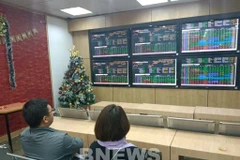Investors, forexample, are interested in Appota, one of nine Southeast Asian digitalcontent startups that most deserve investment, valued at millions ofdollars.
Singaporean and Japanese venture funds have obtainedagreements on investing in the company. Declining to reveal the names ofthe two funds, Do Tuan Anh, CEO of Appota, said the fund would not onlybring capital, but also other important values, including advice onlong-term business strategies.
According to Anh, there are fiveventure investment funds officially operating in Vietnam. There areother funds investing in Vietnam but they do not have head offices inVietnam.
The first foreign venture fund in Vietnam was IDGVentures Vietnam (IDGVV). The fund injected money into many Vietnamesestartups 10 years ago, many of which have become big businesses likeVNG, VC Corp and Vat Gia JSC.
At that time, it was very difficultto approach Vietnamese startups because there was no incubator ortraining program for startups.
Things are getting much easier these days thanks to the establishment of incubators and the larger connection network.
InAsia, Vietnam is believed to have more advantages than some other Asiancountries in developing internet and mobile services thanks to a youngpopulation that easily approaches new services.
Though thereexists a gap in development between urban and rural areas, the digitalgap between areas in Vietnam has narrowed rapidly.
Nguyen HongTruong, vice president of IDGVV, said international investors see all ofthese factors as great advantages for Vietnam.
With thenation’s advantages and the dynamism of young entrepreneurs, the startupmovement in Vietnam has been growing more rapidly than in otherregional countries.
There still exists, however, a big problemfor Vietnamese startups: it is more difficult to access official capitalsources in Vietnam than in other developed countries, whereinternational capital sources are always ready for disbursement.
IDGVVhas invested in 40 businesses which provide mobile and online services,technology, media, entertainment and education. Most of them havewitnessed a stable high growth rate of over 30 percent over the last twoyears.
Of the existing venture funds in Vietnam, IDGVV is said to take high risks when making investment decisions.
Accordingto Dau tu, DFJV, a fund present in Vietnam since 2007, has invested in10 businesses. The newspaper quoted DFJV’s managing director Than TrongPhuc as saying there are not many Vietnamese businesses that can bringhigh profits, while it is not easy to call for capital, though investorsfrom the US, Europe and Asia are injecting money in Vietnam.
WhileIDGVV is believed to be the fund which laid the foundation for thefirst venture investment wave in Vietnam, CyberAgent Adventures (CAV)from Japan is considered the factor that kicked off the second wave.
Whileboth IDGVV and DFJV did not make any outstanding investment deals inthe last two years, CAV has invested in 17 businesses as of the firstquarter of 2014, of which three deals were made in the first quarteralone.-VNA
























